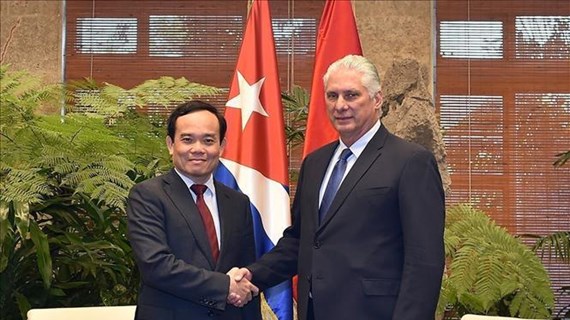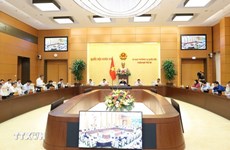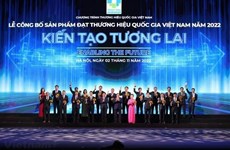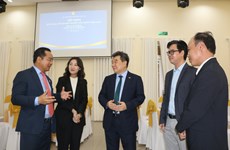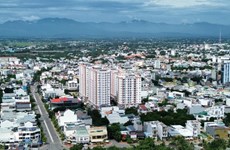SAV to promote experience sharing, training among State Audit Institutes
The State Audit Office of Vietnam (SAV) will continue promoting the sharing of experience and training among State Audit Institutes (SAIs), which is the top priority of the Asian Organisation of Supreme Audit Institutions (ASOSAI), during its final year as ASOSAI Chair in 2021, according to SAV Auditor General Ho Duc Phoc.
 Auditor General Ho Duc Phoc
Auditor General Ho Duc Phoc In an interview with the Vietnam News Agency, Phoc said the move aims to help SAIs make a timely response to constant changes in the public financial management environment.
The SAV is currently working with the ASOSAI’s Capacity Development Committee (the Board of Audit of Japan) and its committees and working groups to share knowledge and good practice and bolster the role of the ASOSAI in supporting its members amid the COVID-19 pandemic, to build an organisation with professional and dynamic SAIs that are able to respond to challenges and emerging issues in the region and the world.
Regarding the audit of water resources in the Mekong River basin, Vietnam continued working with international experts to provide training and set up audit plans for SAIs in January-February. The SAIs will conduct independent audits in coordination with the SAV and with instructions from experts.
In the fourth quarter, the SAV will chair an international conference to share the results of the audit as well as good practice in environmental audits and the sustainable development goals (SDGs).
Due to the complex developments of the pandemic, the State Audit Office of Thailand has proposed holding the 15th ASOSAI Assembly online, with a theme of “ASOSAI and the new normal”. The assembly will work on four aspects: strategic Government roles, the implementation of the SDGs, information technology (IT) application, and responding to emerging issues. These are the main pillars in the AOSAI’s strategic plan for 2022-2027, which was prepared based on regional challenges and to meet the needs of ASOSAI members.
It will be a major challenge for the ASOSAI in general and the SAV in particular, as ASOSAI Chair for the 2018-2021 tenure, to ensure the success of the assembly. The SAV and other SAIs needs to make meticulous preparations for the event, both in content and technical infrastructure.
As ASOSAI Chair, the SAV has made significant contributions to its development. It has been acknowledged by regional and international SAIs and received major assistance from development partners to consolidate management skills and capacity, helping to build the ASOSAI into a professional and modern supreme audit organisation.
The SAV has developed auditing in certain new fields, including IT audits, environmental audits and natural resources audits, and build-operate-transfer (BOT) and build-transfer (BT) project audits, as well as audits on a number of major areas regarding land, education, and healthcare. It has made unceasing efforts to improve auditing capacity and efficiency through gaining experience from SAIs that have advanced skills in the audit of new areas.
It has seen breakthroughs in emerging fields over recent years and posted impressive achievements in environmental audits, management audits, and land and natural resource use audits.
Along with promoting the application of IT in its management and professional endeavours, the SAV has also installed new technologies to better conduct its activities.
Aware of the role technology plays in the sector’s activities, the SAV has studied and integrated new technologies that yield fruitful results compared to traditional methods. It has access to advanced technologies pioneered by SAIs from the UK, Japan, and China, to improve professionalism and efficiency in auditing activities.
Applying IT in audits is a sustainable platform for the development of the SAV in the context of deep digital economic integration. The SAV has issued a strategy on developing its IT during 2019-2025 and vision to 2030, with a view to modernising its activities and enhancing advanced technologies in its operations, with focus sharpened on building its own digital infrastructure and deploying digital technologies, big data analytics, and artificial intelligence.
The ASOSAI was founded in 1979 and pursues a mission common among working groups of the International Organisations of Supreme Audit Institutions (INTOSAI), that “Professional supreme audit institutions promote good State governance”, and with the core values of “Professionalism, Cooperation, Equality, Creativity”.
Its goal is to promote mutual understanding and cooperation among member SAIs through the exchange of ideas and experience in public auditing, creating the conditions necessary for the training of State auditors to improve working quality and efficiency.
The SAV became a member in 1997. In its initial period of membership, it primarily sent auditors to attend training courses and workshops sponsored by the ASOSAI, to enhance professional capacity. Since 2010, the SAV has undertaken a more active role in the association’s professional activities./.





